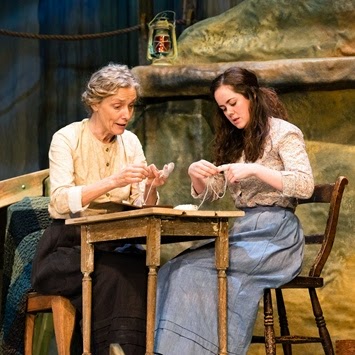Well, it seems an awfully long time since I posted anything on this blog. The reason?...Just life, I think, taking over and filling up all my time. The teen has needed my help persuasion to revise and get ready for her exams; I was faced with an inordinate amount of paperwork to do and this nagged at my conscience each time I sat down and considered writing for pleasure rather than form filling; also I have been suffering with a RSI type elbow pain that has had me wincing every time I go near the keyboard. Now the exams are over for H (they're terrifically early in Scotland), some of the paperwork is done and I can type, slowly, with my left hand!
 |
| Keep reading - all will be revealed |
Our village hall is a rather utilitarian building with little going for it if you were judging purely on aesthetics. But we have a wily committee full of enterprising types who have done much to improve its appeal and increase its use. There's a community cafe, plant sales, a second hand book store, musical performances and a weekly mindfulness session to name just a few of the many events that take place regularly. So it came as no surprise to hear that there was to be a play in the hall and I duly bought tickets. The last time I went to see a 'local' production I had to bite my lip to stifle the giggles as various octogenarians shuffled about in dubious costumes and forgot their lines, and so I was not expecting much. I was to be proved very wrong in my assumptions.
'Get Up and Tie Your Fingers' by Ann Coburn is set against the worst fishing disaster in the UK's history. On the 14th October 1881, 20 boats and 189 men were lost in a storm (129 of them from the small community of Eyemouth, near Berwick). Just up the coast from there, our tiny harbour, Cove, was hit the worst proportionately, losing four of its five boats and 11 of its 21 fishermen. Many of the family-run boats tried desperately to get back into the harbour but were swept past the harbour mouth and onto the rocks in the bay. Women and children were close enough to watch their menfolk drown but had no way of reaching them. You can understand why that terrible day is still referred to as 'Black Friday'. Long-time locals, some of whom are direct descendants of survivors or those who died, explained that the title relates to the call given to rouse the herring lassies who lived and worked in the local area and travelled with the herring down the east coast of the country. These plucky women needed to work at terrific speed, sorting, slicing and gutting up to 60 fish in a minute! Those 'silver darlings' were slippery little blighters, and a gutting knife sharp, and so the women would bind their fingers with cotton strips to protect them from cuts and the stinging pickling salt.
The play managed to pull off that difficult feat - of being deeply moving but at the same time uplifting. Through the characters of young Molly, her obsessive and fearful mother Jean, and fun-loving Janet, the play brought to life the courage and resilience of truly remarkable women while exploring the metaphorical ties between mother and daughter. The cast was entirely women supported in turn by an all female choir. Karen Wimhurst's original score sung a cappella added a haunting quality which was difficult to forget. The inclusion of a nineteenth century children's hymn, 'When Lamps are Lighted in the Town' left hardly a dry eye in the house - a simple and plaintive tribute without being mawkish.
 |
| Bronze sculpture at the Cove to commemorate the tragedy |
 |
| Even the corridor outside the toilets was decorated! |





Good blog Helen, love it. Any patterns for the Fish? xx
ReplyDeleteThanks Debs, there was a specifc pattern for the fish so I'll see if I can get hold of it for you. They were rather funny! x
DeleteWhat an amazing idea for a play. Such history for the area.
ReplyDeleteWhat an appalling tragedy, that must have wiped out almost an entire community. Just devastating, but a terrific starting point for a play. I must say I do like the sound of your local community centre. x
ReplyDelete